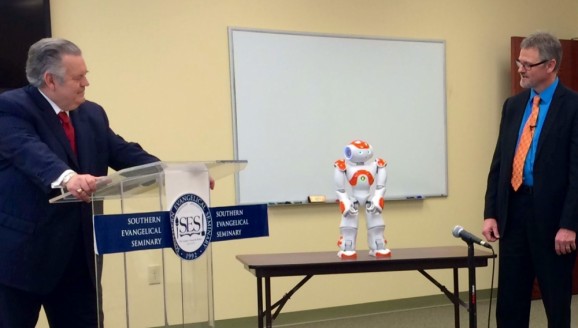Creationists Study The Interactions Between Robots And Humanity
This article is more than 2 years old
 Scientists from many disciplines are busy studying the interactions between humans and robots, and trying to discern the impact of such relationships. Whether it’s teaching autistic children, reducing feelings of isolation in space, or using them as proxies, we’re going to be spending more time with robots. Maybe this will lead to Her style scenarios, or perhaps those more reminiscent of Spielberg’s AI. Only time will tell, but that doesn’t stop us from designing studies and trying to predict the effects. Even creationists can’t resist the pull of automatons. aAgroup of fundamentalist Christians has purchased one of those adorable Nao robots and plan to use it to conduct their own study about the effects of robots on humanity.
Scientists from many disciplines are busy studying the interactions between humans and robots, and trying to discern the impact of such relationships. Whether it’s teaching autistic children, reducing feelings of isolation in space, or using them as proxies, we’re going to be spending more time with robots. Maybe this will lead to Her style scenarios, or perhaps those more reminiscent of Spielberg’s AI. Only time will tell, but that doesn’t stop us from designing studies and trying to predict the effects. Even creationists can’t resist the pull of automatons. aAgroup of fundamentalist Christians has purchased one of those adorable Nao robots and plan to use it to conduct their own study about the effects of robots on humanity.
The South Evangelical Seminary in Matthews, North Carolina gathered $16,000 to make the purchase. They’re the first such organization in the U.S. to study the ethical implications of artificial intelligence. The seminary’s president says students “will be able to delve into the study of robotics, bionics, human enhancement, artificial intelligence and nanotechnology, along with the ethical considerations that arise in each of these arenas.” The school will set up experiments with different groups of various ages and backgrounds then observe their interactions, especially when it comes to receptivity.
Nao’s functionality does provide many opportunities for research and study. It has voice and facial recognition capabilities, including the ability to translate from text and speak in seven languages. It also possesses an impressive range of physical mobility. An early test came when Dr. Kevin Staley, an associate professor of theology who is in charge of the project, brought the robot to a local youth group, where members seemed to bond with the robot and feel bad when it fell over.
Despite the fact that the Bible encourages love, and even says that failure to love is “sin,” Staley says that such emotional responses to robots causes people to “totally withdraw from caring for those in need,” which also constitutes a sin. I’m not sure the two are mutually exclusive. I can feel empathy for a robot while also loving every single person I meet. The seminary also generally believes that the acknowledgement of AI as superior constitutes “idolatry,” and that only God should be granted authority or superiority.
I also find it interesting that the group officially named the robot DAVID (Digitally Advanced Virtual Intelligence Device, after Michelangelo’s creation). Naming only reinforces opportunities for empathy, and personifies the robot, despite the seminary’s belief that only human relationships can bring true fulfillment. They oppose the use of robots to, say, care for the elderly, but if it’s a choice between a robotic telepresence or technological help and neglect or lack of attention, then would they agree that the robot is better than nothing?
Still, there’s no harm in investigating implications and ethics of existing and emerging technology. In fact, it’s essential. And for a seminary to pursue such a cutting-edge study is laudable.












